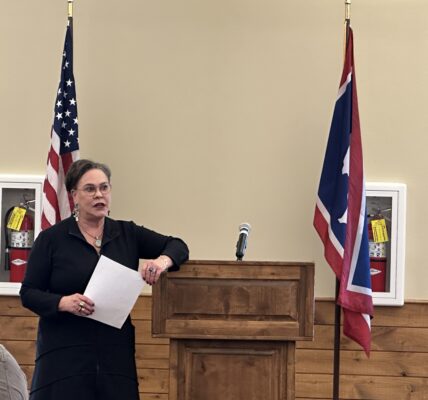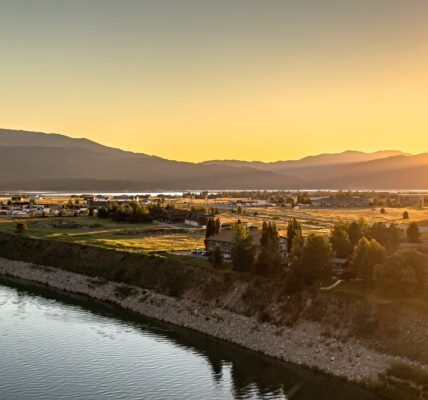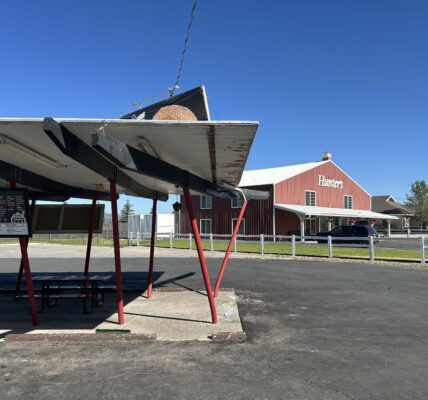Afton hopeful EPA will work on research with town and DEQ on water disagreement

The Town of Afton is hopeful the Environmental Protection Agency (EPA) will work with the town and Wyoming Department of Environmental Quality (DEQ) on a water disagreement.
Town Administrator Violet Sanderson says the Region 8 EPA out of Denver is the authority on the drinking water in the state.
“We are the only state in the union that does not have primacy over our own drinking water,” Sanderson said. “So, because of that, they are the ones that can come in and make determinations and regulate our drinking water systems in way that we feel, currently, is arbitrary.”
She says they came forward with “a predetermination” that the EPA suspected the intermittent spring is under the “direct influence of surface water”. The administrator acknowledges the town is currently regulated as a groundwater source.
“This allows us a little flexibility in what we do,” Sanderson said. “Both from…efficiency and economics standpoints I guess you would say.”
She says if the EPA’s predetermination moves into a determination, it would require the town to put in a treatment facility with filtration. She says this would be a “costly expense” to the town and the users of the system. She also says this would not just be the initial cost to build the facility.
“But also, the general operation and maintenance of such a facility and filtration being a part of our system,” Sanderson said. “So, that is what the town of Afton has been up against.”
She says where the issue lies is the EPA does not have complete information and a full scientific scope. The administrator says there are new ways of engineering and new technologies to gain the information the regulatory agency will need to make a good decision about the water in Afton.
They called for a public hearing in September and had a public comment period.
This allowed people to add comments to a docket online and the town of Afton submitted their own as well with this. She also says the town reached out to the administrator of Region 8 to have a meeting to discuss ideas and options with a study of their system. The idea is to see if surface water influences the current system established.
“Luckily, the EPA was receptive to our request,” Sanderson said.
She says they recently met with Wyoming DEQ, the Region 8 regulatory agency, and the town of Afton to discuss potential designs and study options.
“Now, obviously, the EPA did not make any formal promises to stave off their determination,” Sanderson said. “But they were open and receptive to the idea of us even talking about it, which was more than they’ve moved in the past on that.”
She says they will also respond to the questions people posed in the public comments. She says anyone is welcome to see the comments the town provided. You can see that on the docket online. The comment period is closed, but it is still available to be viewed. She says she is grateful for leadership and others who added their points and concerns.
She says Dr. Jennifer Clancy of Clancy and Associates LLC. Is one of the co-authors of the Consensus Method. This is what the Region 8 EPA uses to look at MPA scores and tests. She says the WSP USA also is an environmental structure group that has worked with many people throughout the country on similar drinking water systems in Afton.
“So, we’re really thankful we had those two resources to utilize for our comments,” Sanderson said. “They are very pro ‘you don’t have enough information to make this determination EPA’.”
They also want everyone to sit down together to draft a study. She also says she told the regulatory agency the state of Wyoming will help pay to gather research on the drinking water. She says the state has been supportive in helping the town on this issue.
“With that being said, it would be a waste of time and money for us to move forward with this study if the EPA does not have buy-in in it,” Sanderson said. “This is an opportunity for us to work collaboratively with them and that’s what our hope is.”
She says from there, once the information is gathered, we can all make the right determination on what the drinking water system is. She says the EPA says they are focused on answering all the public comments right now, but they did talk about a possible timeline for a study of this nature.
“As everybody knows who lives here in Star Valley and our area here in Afton,” Sanderson said, “We have a short window of when people can be boots on the ground looking up there at our potential recharge area.”
She says with all these things that need to be accounted for, it may be another three to four years before all the information can be gathered. She says the town is in a wait-and-see period with the EPA not making a commitment to a new study, but she encourages everyone to become as informed as possible on how the EPA makes these determinations. The administrator says most people do not know that the state does not have primacy over its own drinking water and so just having the knowledge on how it all has to operate is important.





